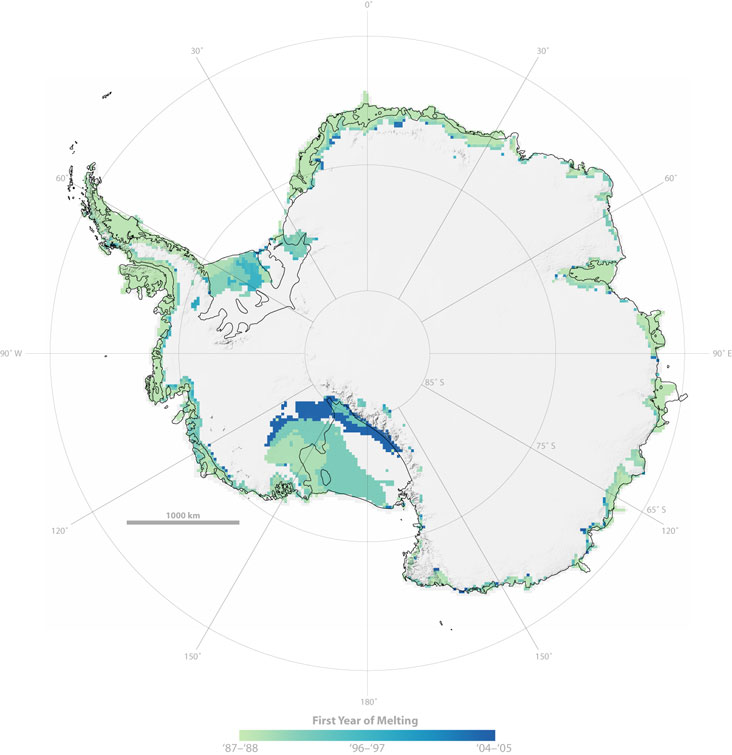Antarctic Ice Melt Accelerates Amid New Zealand's Climate Policy Retreat

As the effects of climate change become increasingly alarming, a recent report has revealed that the rate of sea ice melting around Antarctica is accelerating at unprecedented levels. This development coincides with the New Zealand government's withdrawal from key international climate commitments, raising significant concerns among environmentalists and scientists regarding the country's environmental policy direction.
On July 7, 2025, the Green Party of Aotearoa New Zealand highlighted these alarming findings, stating that the current government under Prime Minister Christopher Luxon has not only abandoned crucial climate agreements but is also facing legal challenges for its inadequate climate strategies. Green Party co-leader Marama Davidson stated, "This is a clear and urgent signal that the climate crisis is accelerating, and a critical tipping point may have already been passed. It’s not a distant threat; it’s here."
According to a 2023 study published in the Journal of Glaciology, researchers from the University of Otago found that Antarctic sea ice extent has decreased significantly, with a record low observed during the previous winter season. Dr. Emily Thompson, a glaciologist at the university and co-author of the study, explained, "The patterns we are observing are consistent with predictions made by climate models that account for the effects of global warming."
The report from the Antarctic Climate Change Centre notes that the melting ice contributes to rising sea levels, which pose a direct threat to coastal communities worldwide. The current rate of melting is estimated to contribute approximately 0.5 millimeters to global sea level rise annually, a figure that could double by 2050 if trends continue.
The Luxon government’s recent decision to withdraw from the Beyond Oil and Gas Alliance, a coalition of countries committed to phasing out fossil fuels, has raised eyebrows among climate advocates. This move has been criticized as undermining New Zealand's credibility in international climate negotiations. Marama Davidson stated, "We cannot afford to let short-term thinking dictate our climate policy. The government’s actions are failing to meet the urgency of the climate crisis we face."
In addition to withdrawing from the Beyond Oil and Gas Alliance, the government has been criticized for its investment in new gas fields, which Davidson argues is a breach of the Agreement on Climate Change, Trade, and Sustainability (ACCTS). "This government is prioritizing short-term economic gains over long-term environmental sustainability," Davidson added.
Experts believe that New Zealand's retreat from its climate commitments could have global ramifications. Dr. Richard Adams, a climate policy expert at Victoria University of Wellington, remarked, "New Zealand has historically been viewed as a leader in environmental stewardship. This recent shift could not only impact our domestic policies but also set a concerning precedent for other nations."
The implications of the Antarctic ice melt extend beyond national borders. A report from the United Nations Intergovernmental Panel on Climate Change (IPCC) warns that without immediate and sustained action, global temperatures could rise by more than 1.5 degrees Celsius by 2030, leading to catastrophic consequences for ecosystems and human populations alike.
In light of these developments, environmental organizations are calling for urgent action from the New Zealand government to fulfill its international obligations. They advocate for increased investment in renewable energy sources and climate-resilient infrastructure as critical components of an effective climate strategy.
Looking ahead, the future of New Zealand's climate policy remains uncertain. As global awareness of climate issues grows, the pressure on the government to align its policies with scientific consensus and public expectations will likely intensify. Failure to act could not only exacerbate environmental degradation but also undermine New Zealand's position in the international community as a responsible actor in climate governance.
In conclusion, the melting Antarctic ice serves as a stark reminder of the realities of climate change. New Zealand's retreat from climate commitments poses a significant threat not only to its own ecological future but also to global efforts aimed at combating climate change. The need for decisive action and leadership has never been more urgent, as the window of opportunity to mitigate the worst impacts of climate change continues to close.
Advertisement
Tags
Advertisement





